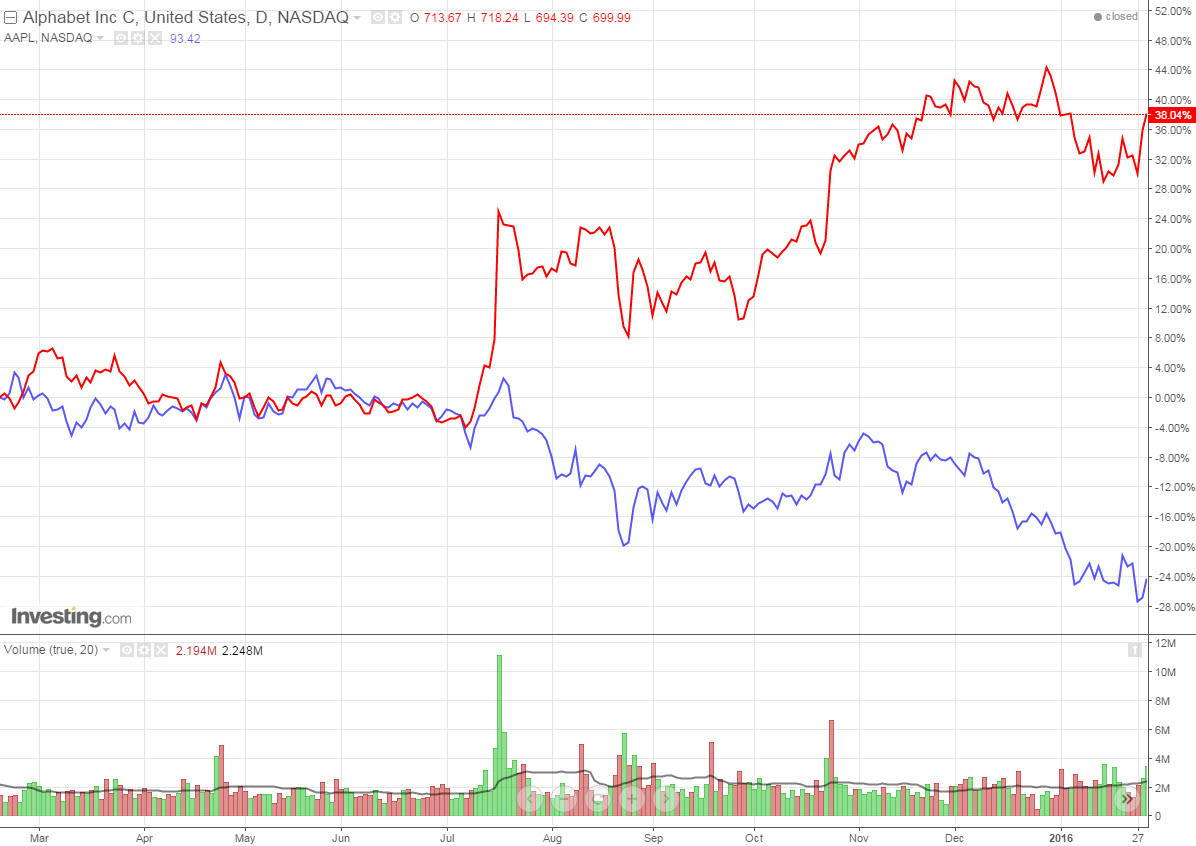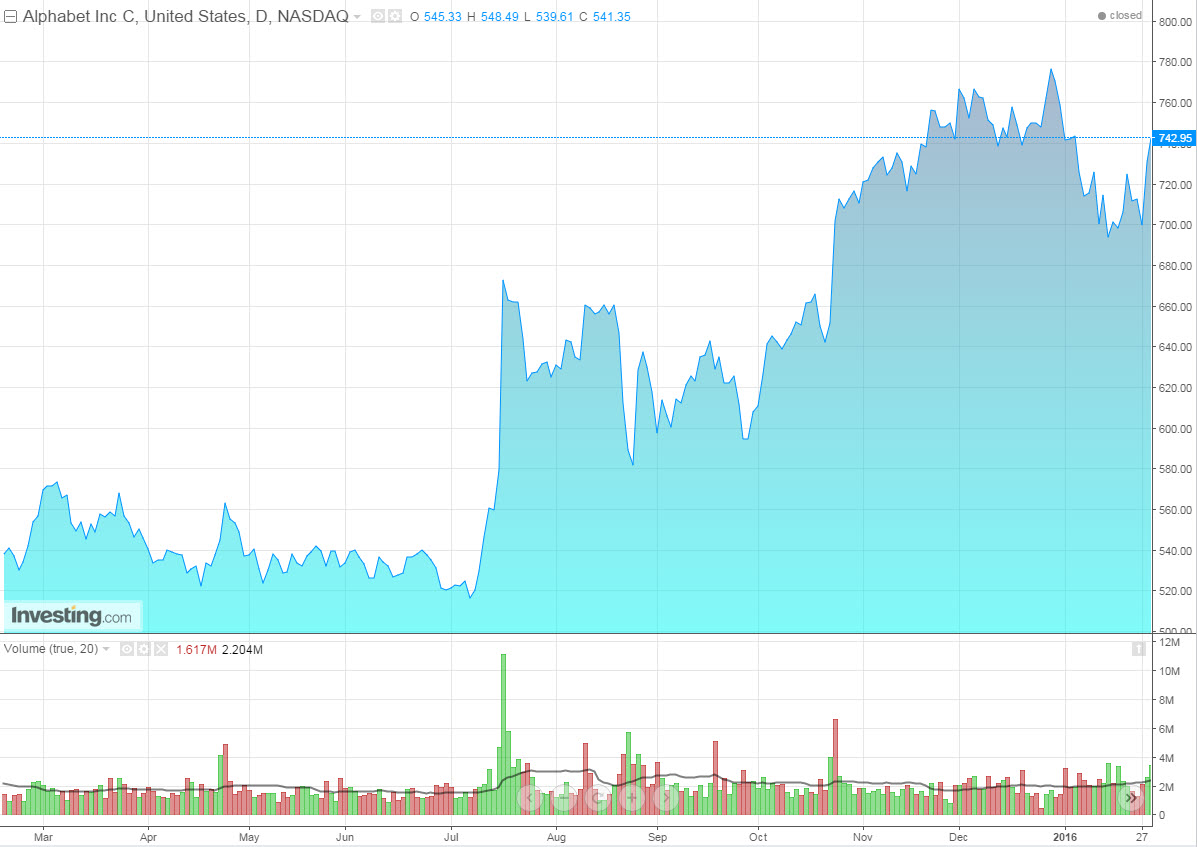by Clement Thibault
$22 Billion. That's all that currently separates Apple (O:AAPL), the S&P 500 company with the largest market cap, at $539B from Alphabet (O:GOOG), at $517B.
As a stand-alone sum, $22B is huge, but if you look at it another way, that's only about 4% of Apple's current market cap. The point? The gap between the valuation of the two tech giants has been shrinking drastically because of the beating Apple stock has taken over the past two months. And Alphabet's Q4 earnings, reported later today, could be the catalyst that pushes the search behemoth into first place.
Fact is, since October 1st 2015, Alphabet's share price has risen by 21.53% from $642 to $761, while Apple's share price has dropped by 11.17%, from $109 to 97.34 as of Friday's close. In times where stocks routinely move up or down by 3% a day, a new market cap king could be crowned in a matter of hours.

Alphabet's earnings, which will be reported later today, after the bell, should provide very interesting insight into the company's profitability whether its valuation ultimately grows, or not. As is well known, this past August, Google (O:GOOGL) decided to re-organize and established a parent company, which it named Alphabet.
The goal of the reorganization was to separate Google's core ad business from its other, more risky ventures. Therefore, this is the first time we'll see more specific details from the different sides of Alphabet's business. Estimated EPS for the entire Alphabet organization is $6.65, up from $5.5 last year, while the Q4 revenue for the Google side of the business is expected to top $20 billion.

From a longer-term point of view, Alphabet itself has become a more interesting company, as the resources gathered from its core ad business allow the company to allocate major investments in research and innovation. Alphabet may be the parent company of Google, but it also owns Google Fiber, a high-speed internet provider; Google Ventures which provides seed- and growth-stage funding to technology start-ups, Google Capital a growth equity fund that also invests in smaller companies, Google X an R&D incubator for such whiz-bang technology plays as driverless cars, robots and drones; as well as Calico Labs which specializes in researching and finding cures for age-related diseases, and Nest Home which develops and sells smart technology such as smoke detectors and thermostats for consumers. Each of these projects comes with its own risks, but it's obvious the upside for any and all of these divisions would be tremendous. (Imagine if Calico figures out a way to achieve immortality. How cool would that be?)
Google's core business is also evolving, most recently with the launch of YouTube Red in October 2015, a subscription-based, ad-free version of the popular streaming video service. According to TechCrunch, the YouTube application for iOS skyrocketed from the 200th to the 6th spot on its top grossing list since the service was launched.
Sensor Tower, which provides intelligence on app store activity, says this would mean about $350,000 in revenue per day from iOS users since October. YouTube Red is a clever brand extension, building on YouTube's immense popularity—over a billion users, a third of all internet users—and could turn all of the YouTube operation profitable with just a relatively low percentage of conversions to the premium offering.
Alphabet has an operating cash flow of 1.5 times its income, a ratio suggesting it has considerable ability to fund itself through its profitable divisions. It also has a current ROIC of 28.8%, even with all its ambitious projects, which generated R&D costs of over $8.7 billion in the first three quarters of 2015. Additionally, and famously, the company employs the right human capital to make things happen, even if some of Alphabet's vaunted projects eventually and inevitably fail.
For now, even the tax issues that were plaguing the company have disappeared when Google reached a deal to pay 130 million pounds in the UK, a 3% effective tax rate on its revenues. Both its core business and extracurricular activities seem to be falling into place, and Alphabet is entering 2016 with all burners blazing.
Indeed, Alphabet is currently in a much better position to tackle innovation challenges and bring new, appealing products to market outside of the struggling premium smartphone segment, something Apple has been having a lot of trouble with. Alphabet's projected growth of 20.79% for 2016 is currently seven times higher than Apple's projected 2.83%.
Add all this up and it wouldn't surprise if sooner rather than later there's a new market cap leader on the S&P. Perhaps as soon as tomorrow.
